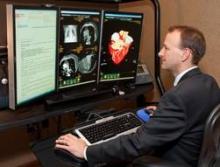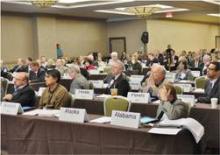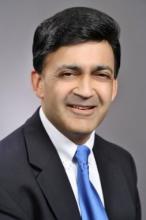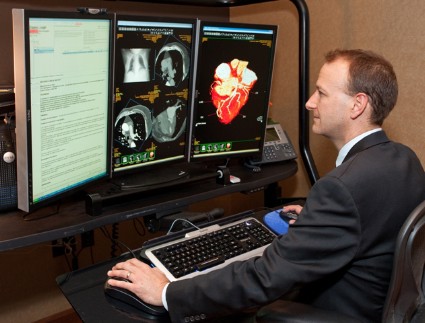User login
The process of obtaining multiple medical licenses by which more physicians would be able to practice telemedicine across state lines soon may be streamlined by a compact proposed by the Federation of State Medical Boards.
"There’s not been an interstate medical licensure compact before," Dr. Humayun J. Chaudhry, FSMB president and CEO said in an interview. "It would provide for the very first time, to those physicians who wanted it, the ability to practice medicine in many more jurisdictions than ever before."
The FSMB House of Delegates unanimously approved the development of an interstate compact to expedite medical licensure and facilitate multistate practice at their 2013 annual meeting. A compact refers to a constitutionally authorized contract between compact states that responds to a collective problem without nationalization of the issue. The process is now in the drafting stage and state board leaders expect to release a final draft in late summer or early fall of 2014.
Under the proposed system, physicians interested in practicing in multiple states could receive a license in each participating state through an expedited process. States and doctors would voluntarily enter into the compact, and approved physicians would be under the jurisdiction of the state medical board in which the patient is located at the time of the medical interaction. State boards of medicine would retain their individual authority for discipline and oversight, according to the proposed compact.
The ongoing advancement of telemedicine, concern over physician shortages, and access to care issues contributed to the compact’s creation, Dr. Chaudhry said.
"We wanted to make sure at the state medical board level, that we were doing everything we could to enable greater portability of the practice of medicine, but at the same time, making sure it was done in a way that protects the public."
Currently, physicians who practice telemedicine in multiple states must have a license in the state in which they physically practice, and the state in which the patient is treated. Generally, this means physicians have to fill out multiple applications and go through separate application processes.
Dr. Benjamin Strong, a teleradiologist, said he was initially surprised to experience such extensive evaluation every time he pursued a license in a new state. He now holds medical licenses in all 50 states.
"Each state insisted on pursuing its own investigation in spite of the fact that so many had previously licensed me, and I was even more surprised that each state raised different, but legitimate questions," said Dr. Strong, chief medical officer for vRad, a global telemedicine company and radiology practice. "My record is quite clean and yet still, on my 50th license, there were questions about this certificate or that unaccounted-for time period that had not been asked by prior states."
In addition, some states make it difficult for out-of-state physicians to practice in their jurisdiction, said Gary Capistrant, senior director for public policy at the American Telemedicine Association. At least 14 states have legislation placing restrictions on the practice of telemedicine across state borders. The rules often require full and unrestricted state licensure for out-of-state physicians providing services via telemedicine and require doctors to pay duplicate licensure fees.
"How many of you have driver’s licenses in two states?" Mr. Capistrant asked an audience at an American Bar Association (ABA) physicians’ legal issues conference in Chicago. "And yet, physicians need a [medical] license in each state."
The compact also plans to address complaint investigations of physicians and increase teamwork by state medical boards. Currently, the launch of investigations that were undertaken in response to complaints are not shared among jurisdictions. Only final disciplinary actions taken by state medical boards are made available.
The lack of communication among states and sometimes redundant examinations create burdens for physicians and exhaust resources, experts said. In some cases, multiple states investigate the same incident and reach different conclusions, Ryan Check, vRad vice president and general counsel, said at the ABA conference.
"The risk of cascading investigations is something that causes significant headaches to our team," Mr. Check said.
Language in the proposed compact would allow participating state boards to inform other boards when a physician is being investigated and share information. The cooperation would enable a quicker response to the issue, rather than waiting for an action to be taken," Dr. Chaudhry said.
But Dr. Strong questioned whether the compact can save costs and time, while still conducting necessary evaluations of participating physicians.
"While logistically, an interstate licensing compact makes sense – lower cost, markedly reduced effort on the part of the licensing boards and credentialing committees, greater mobility for physicians – I believe it must include a very extensive investigation into each physician, such that the savings in cost, time, and effort may not be as great as one might think at first glance," he said in an interview. "To institute an interstate compact, the licensing process will have to include every conceivable detail and meet the standards of every state, which undoubtedly will be a difficult task and which will not provide the simplicity I think many physicians hope for."
The state boards of medicine intend to present the final compact draft to state legislators for their consideration in 2015 legislative sessions.
The process of obtaining multiple medical licenses by which more physicians would be able to practice telemedicine across state lines soon may be streamlined by a compact proposed by the Federation of State Medical Boards.
"There’s not been an interstate medical licensure compact before," Dr. Humayun J. Chaudhry, FSMB president and CEO said in an interview. "It would provide for the very first time, to those physicians who wanted it, the ability to practice medicine in many more jurisdictions than ever before."
The FSMB House of Delegates unanimously approved the development of an interstate compact to expedite medical licensure and facilitate multistate practice at their 2013 annual meeting. A compact refers to a constitutionally authorized contract between compact states that responds to a collective problem without nationalization of the issue. The process is now in the drafting stage and state board leaders expect to release a final draft in late summer or early fall of 2014.
Under the proposed system, physicians interested in practicing in multiple states could receive a license in each participating state through an expedited process. States and doctors would voluntarily enter into the compact, and approved physicians would be under the jurisdiction of the state medical board in which the patient is located at the time of the medical interaction. State boards of medicine would retain their individual authority for discipline and oversight, according to the proposed compact.
The ongoing advancement of telemedicine, concern over physician shortages, and access to care issues contributed to the compact’s creation, Dr. Chaudhry said.
"We wanted to make sure at the state medical board level, that we were doing everything we could to enable greater portability of the practice of medicine, but at the same time, making sure it was done in a way that protects the public."
Currently, physicians who practice telemedicine in multiple states must have a license in the state in which they physically practice, and the state in which the patient is treated. Generally, this means physicians have to fill out multiple applications and go through separate application processes.
Dr. Benjamin Strong, a teleradiologist, said he was initially surprised to experience such extensive evaluation every time he pursued a license in a new state. He now holds medical licenses in all 50 states.
"Each state insisted on pursuing its own investigation in spite of the fact that so many had previously licensed me, and I was even more surprised that each state raised different, but legitimate questions," said Dr. Strong, chief medical officer for vRad, a global telemedicine company and radiology practice. "My record is quite clean and yet still, on my 50th license, there were questions about this certificate or that unaccounted-for time period that had not been asked by prior states."
In addition, some states make it difficult for out-of-state physicians to practice in their jurisdiction, said Gary Capistrant, senior director for public policy at the American Telemedicine Association. At least 14 states have legislation placing restrictions on the practice of telemedicine across state borders. The rules often require full and unrestricted state licensure for out-of-state physicians providing services via telemedicine and require doctors to pay duplicate licensure fees.
"How many of you have driver’s licenses in two states?" Mr. Capistrant asked an audience at an American Bar Association (ABA) physicians’ legal issues conference in Chicago. "And yet, physicians need a [medical] license in each state."
The compact also plans to address complaint investigations of physicians and increase teamwork by state medical boards. Currently, the launch of investigations that were undertaken in response to complaints are not shared among jurisdictions. Only final disciplinary actions taken by state medical boards are made available.
The lack of communication among states and sometimes redundant examinations create burdens for physicians and exhaust resources, experts said. In some cases, multiple states investigate the same incident and reach different conclusions, Ryan Check, vRad vice president and general counsel, said at the ABA conference.
"The risk of cascading investigations is something that causes significant headaches to our team," Mr. Check said.
Language in the proposed compact would allow participating state boards to inform other boards when a physician is being investigated and share information. The cooperation would enable a quicker response to the issue, rather than waiting for an action to be taken," Dr. Chaudhry said.
But Dr. Strong questioned whether the compact can save costs and time, while still conducting necessary evaluations of participating physicians.
"While logistically, an interstate licensing compact makes sense – lower cost, markedly reduced effort on the part of the licensing boards and credentialing committees, greater mobility for physicians – I believe it must include a very extensive investigation into each physician, such that the savings in cost, time, and effort may not be as great as one might think at first glance," he said in an interview. "To institute an interstate compact, the licensing process will have to include every conceivable detail and meet the standards of every state, which undoubtedly will be a difficult task and which will not provide the simplicity I think many physicians hope for."
The state boards of medicine intend to present the final compact draft to state legislators for their consideration in 2015 legislative sessions.
The process of obtaining multiple medical licenses by which more physicians would be able to practice telemedicine across state lines soon may be streamlined by a compact proposed by the Federation of State Medical Boards.
"There’s not been an interstate medical licensure compact before," Dr. Humayun J. Chaudhry, FSMB president and CEO said in an interview. "It would provide for the very first time, to those physicians who wanted it, the ability to practice medicine in many more jurisdictions than ever before."
The FSMB House of Delegates unanimously approved the development of an interstate compact to expedite medical licensure and facilitate multistate practice at their 2013 annual meeting. A compact refers to a constitutionally authorized contract between compact states that responds to a collective problem without nationalization of the issue. The process is now in the drafting stage and state board leaders expect to release a final draft in late summer or early fall of 2014.
Under the proposed system, physicians interested in practicing in multiple states could receive a license in each participating state through an expedited process. States and doctors would voluntarily enter into the compact, and approved physicians would be under the jurisdiction of the state medical board in which the patient is located at the time of the medical interaction. State boards of medicine would retain their individual authority for discipline and oversight, according to the proposed compact.
The ongoing advancement of telemedicine, concern over physician shortages, and access to care issues contributed to the compact’s creation, Dr. Chaudhry said.
"We wanted to make sure at the state medical board level, that we were doing everything we could to enable greater portability of the practice of medicine, but at the same time, making sure it was done in a way that protects the public."
Currently, physicians who practice telemedicine in multiple states must have a license in the state in which they physically practice, and the state in which the patient is treated. Generally, this means physicians have to fill out multiple applications and go through separate application processes.
Dr. Benjamin Strong, a teleradiologist, said he was initially surprised to experience such extensive evaluation every time he pursued a license in a new state. He now holds medical licenses in all 50 states.
"Each state insisted on pursuing its own investigation in spite of the fact that so many had previously licensed me, and I was even more surprised that each state raised different, but legitimate questions," said Dr. Strong, chief medical officer for vRad, a global telemedicine company and radiology practice. "My record is quite clean and yet still, on my 50th license, there were questions about this certificate or that unaccounted-for time period that had not been asked by prior states."
In addition, some states make it difficult for out-of-state physicians to practice in their jurisdiction, said Gary Capistrant, senior director for public policy at the American Telemedicine Association. At least 14 states have legislation placing restrictions on the practice of telemedicine across state borders. The rules often require full and unrestricted state licensure for out-of-state physicians providing services via telemedicine and require doctors to pay duplicate licensure fees.
"How many of you have driver’s licenses in two states?" Mr. Capistrant asked an audience at an American Bar Association (ABA) physicians’ legal issues conference in Chicago. "And yet, physicians need a [medical] license in each state."
The compact also plans to address complaint investigations of physicians and increase teamwork by state medical boards. Currently, the launch of investigations that were undertaken in response to complaints are not shared among jurisdictions. Only final disciplinary actions taken by state medical boards are made available.
The lack of communication among states and sometimes redundant examinations create burdens for physicians and exhaust resources, experts said. In some cases, multiple states investigate the same incident and reach different conclusions, Ryan Check, vRad vice president and general counsel, said at the ABA conference.
"The risk of cascading investigations is something that causes significant headaches to our team," Mr. Check said.
Language in the proposed compact would allow participating state boards to inform other boards when a physician is being investigated and share information. The cooperation would enable a quicker response to the issue, rather than waiting for an action to be taken," Dr. Chaudhry said.
But Dr. Strong questioned whether the compact can save costs and time, while still conducting necessary evaluations of participating physicians.
"While logistically, an interstate licensing compact makes sense – lower cost, markedly reduced effort on the part of the licensing boards and credentialing committees, greater mobility for physicians – I believe it must include a very extensive investigation into each physician, such that the savings in cost, time, and effort may not be as great as one might think at first glance," he said in an interview. "To institute an interstate compact, the licensing process will have to include every conceivable detail and meet the standards of every state, which undoubtedly will be a difficult task and which will not provide the simplicity I think many physicians hope for."
The state boards of medicine intend to present the final compact draft to state legislators for their consideration in 2015 legislative sessions.




